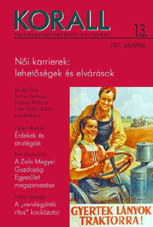Érdekek és stratégiák. A helyi politikai elit érdekérvényesítési lehetőségei a kárpátaljai régió vármegyéiben a dualizmus időszakában
Interests and Strategies. The Local Political Elite’s Chances to Enforce Interest in the Counties of the Kárpátalja Region under Dualism
Author(s): András CiegerSubject(s): History
Published by: KORALL Társadalomtörténeti Egyesület
Keywords: social history; political history; élite; north-east Hungary; 19th century; enforcement of interests; political networks; elections; associations; parties; Freemasonry; Clubs
Summary/Abstract: The study is based on the prosopographic analysis of the leading political groups (lord lieutenants, sub-prefects, members of parliament) in the counties of Bereg, Ugocsa, Ung and Máramaros under dualism. In the focus of the paper is the interpretation of different techniques of local elite recruitment and individual interest validation and the three most typical recruitment channels and processes that were revealed by examining the career paths. Mapping the network of relatives demonstrates the closed nature of local elites, however, the examination of how key positions in the local political elite were filled, points at the effective self-recruiting ability of elite families. In spite of these facts, by drawing on counter-examples, this study urges to refine the simplifying image according to which networks of relatives played an exclusive role in the distribution of political functions and in decision-making. On the other hand, networks based on membership in associations played a huge role as well. This study takes a closer look at the life and social composition of county casinos and free masonry lodges as well, since local political, economic and cultural elites took an active part these. Finally, the study presents the compromise between local interests and central power (as a regional specialty): counties of the region began to expect from the election of „famous” people or „unknown” persons provided with influential connections but lacking local connections that they would represent local interests better. The most important conclusion of the paper is that even around the end of the period one can rather talk about political elites bound to that locality than about a regional leading stratum cultivating intensive, cross-county relations.
Journal: Korall - Társadalomtörténeti folyóirat
- Issue Year: 2003
- Issue No: 13
- Page Range: 87-106
- Page Count: 20
- Language: Hungarian

